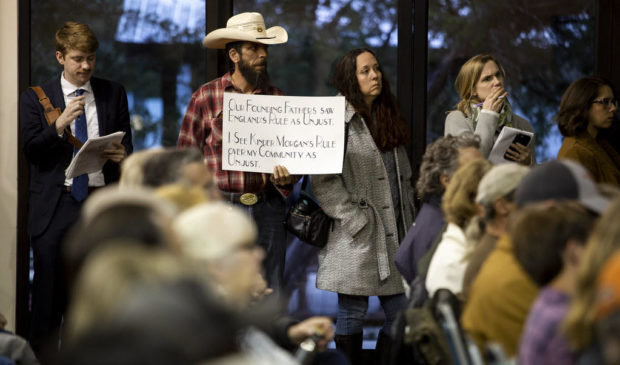Newsletter Signup
The Austin Monitor thanks its sponsors. Become one.
Most Popular Stories
- Austin opens new affordable housing development in Southeast Austin
- Landmark commission says goodbye to Nau’s Enfield Drug
- Congress Avenue transformation plan gets support from Urban Transportation Commission
- After a decline last year, Travis County homeowners should expect a return to rising property taxes
- ZAP Commission forwards recommendation allowing some commercial uses in residential zones
-
Discover News By District

New Texas pipeline protest law is about more than pipelines
Wednesday, September 4, 2019 by Mose Buchele, KUT
A law went into effect in Texas this week that increases penalties for demonstrators who interfere with oil and gas pipelines and other pieces of “critical infrastructure.”
Oil and gas states have adopted such laws to crack down on demonstrations like the one at Standing Rock, where protesters disrupted construction of the Dakota Access Pipeline. As the legislation was debated in Texas, attention focused on the impact it might have on opposition to the natural gas pipeline planned for the Hill Country.
But the law applies to more than pipelines. It is now a felony in Texas to trespass on “critical infrastructure” in order to damage property or interfere with operations. Critical infrastructure includes pipelines, ports, feedlots, trucking terminals, dams, petrochemical plants and many other facilities. (Find a full list here.)
The law counts as critical infrastructure a facility or pipeline “that is under construction and all equipment and appurtenances used during that construction.”
It also allows groups to be sued or fined up to half a million dollars for supporting demonstrators.
Industry groups support the law, saying it will increase safety around oil and gas infrastructure.
“There are ways to protest, but don’t do it on a construction site because you could get hurt or hurt somebody else,” Allen Fore, a spokesman for pipeline company Kinder Morgan, told KUT before the law took effect.
But opponents say the law is already having a chilling effect on legally protected protest.
Daphne Silverman, a defense lawyer who has represented protesters, says the statute is overly vague when it comes to what constitutes trespassing, leaving it open to constitutional challenge.
For example, she says, the law applies not only in places where there is a barrier “obviously designed to exclude intruders” from an area, but also to “equipment and appurtenances” used in the construction of pipelines and other facilities.
“Normally you have to be able to see whether or not you can go on this property,” she says.
She says other portions of the statute may be difficult to prosecute. For example, it criminalizes trespassing with “intent” to disrupt or damage infrastructure.
“Even in conspiracy cases, there (has to be a crime) committed by members of the conspiracy before it can be charged,” she says. “So I’m going to be curious to see how prosecutors are going to charge this.”
Nonetheless, if the goal of the new law is to dissuade people from protesting, Silverman believes it is already working.
“I do have some nonprofit clients and I know that they are concerned about their own liability for any protest support at this stage,” she says.
This story was produced as part of the Austin Monitor’s reporting partnership with KUT. Photo by Salvador Castro for KUT.
The Austin Monitor’s work is made possible by donations from the community. Though our reporting covers donors from time to time, we are careful to keep business and editorial efforts separate while maintaining transparency. A complete list of donors is available here, and our code of ethics is explained here.
You're a community leader
And we’re honored you look to us for serious, in-depth news. You know a strong community needs local and dedicated watchdog reporting. We’re here for you and that won’t change. Now will you take the powerful next step and support our nonprofit news organization?








